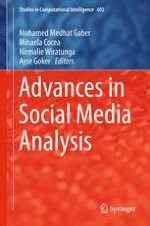2015 | OriginalPaper | Chapter
Sentiment Analysis Using Domain-Adaptation and Sentence-Based Analysis
Authors : Gizem Gezici, Berrin Yanikoglu, Dilek Tapucu, Yücel Saygın
Published in: Advances in Social Media Analysis
Publisher: Springer International Publishing
Activate our intelligent search to find suitable subject content or patents.
Select sections of text to find matching patents with Artificial Intelligence. powered by
Select sections of text to find additional relevant content using AI-assisted search. powered by
